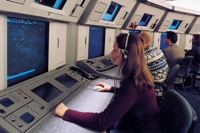Eurocontrol inaugurates new air traffic management center
Eurocontrol, Europe's air navigation agency, inaugurated a new air traffic management center to cope with ever-increasing traffic.

A new Central Flow Management Unit will streamline air traffic control procedures to improve efficiency and facilitate the steady growth of air travel demand on the continent and over the Atlantic in the next decade, said Victor Aguado, Eurocontrol's director general.
The new unit will serve as "a cornerstone" of as part of its long-delayed program to create a Single European Sky, Aguado said at the launch of the new air traffic management center.
Air traffic management in Europe has been relatively inefficient compared with large systems elsewhere, such as in the United States, because national governments have been unwilling to relinquish control of their countries' air spaces.
But with an annual growth rate of 5 percent per year, the current 33,000 flights a day in European air space are forecast to more than double by 2020, putting huge pressure on the system and resulting in massive delays, experts warn.`
In response, Eurocontrol began pressing for the so-called Single European Sky concept, where a centralized traffic management center would coordinate most of the continent's air traffic needs.
This would approximate America's Next Generation Air Transportation System, which the U.S. Federal Aviation Administration wants to initiate to meet the demands on the U.S. aviation system.
"A trans-Atlantic interoperability initiative has already been launched to coordinate the two systems," Jacques Barrot, the European Union's commissioner for transport, said at the opening ceremony.
The new flow management center features three huge computer screens displaying the weather over the entire continent, traffic over the north Atlantic including every aircraft and its route, and the flight route of each airliner within European air space.
Operators will be able to identify potential bottlenecks quickly and reroute traffic or keep planes on the ground until the jams dissipate, said Richard Dyett, who heads the unit's operational training section.
"Flow-management is very important in Europe because of its confined size compared to the United States, where it's relatively easy to divert aircraft without saturating adjacent air space," Dyett said.
EU member states have opposed the concept of a united sky since the 1960s, but as pressure for greater safety and environmental considerations mounted, governments were gradually brought on board. The Single European Sky air traffic management system is expected to become operational in the next decade.
Subscribe to Pravda.Ru Telegram channel, Facebook, RSS!


